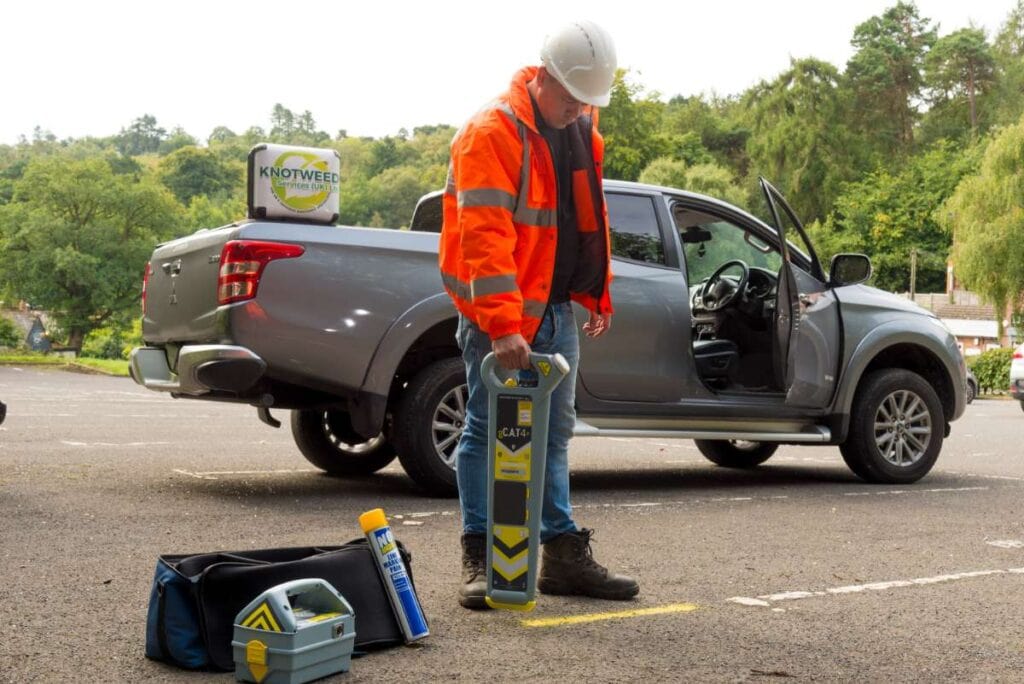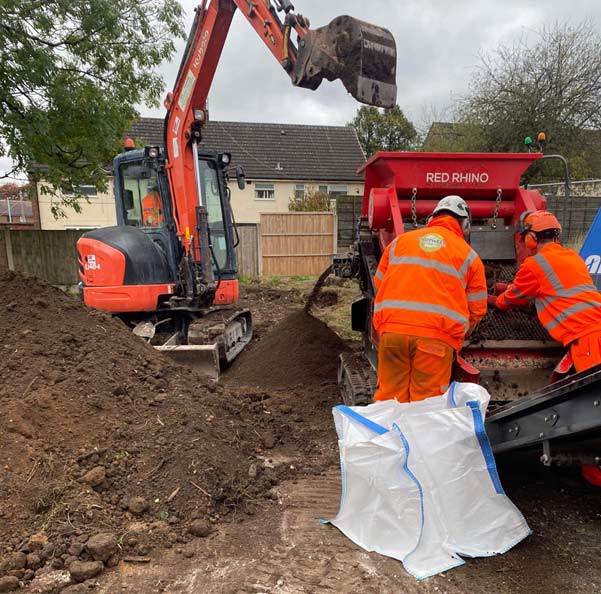JAPANESE KNOTWEED REMOVAL Fordingbridge
6
LIVE KNOTWEED JOBS IN Fordingbridge
99
SUCCESSFUL KNOTWEED REMOVAL PROJECTS IN Fordingbridge
100%
SUCCESSFUL PROPERTY SALES AFTER TREATMENT
5
Fordingbridge BASED KNOTWEED STAFF
NO OTHER JAPANESE KNOTWEED COMPANIES IN Fordingbridge HAVE OUR TRACK RECORD
As one of the leading Japanese knotweed removal companies serving Fordingbridge, Knotweed Services offers prompt, efficient removal of the troublesome weed, at a price that is sure to be affordable for you.
Knotweed Services is a member of the PCA, a government-approved trade body representing the “damp, waterproofing, wood preservation and invasive weeds industries.” We can offer you the best treatment and control methods for Japanese knotweed.
Our extensive knotweed removal expertise has allowed us to tackle and solve a number of large and complex eradications in and around Fordingbridge and England. Effective knotweed plant control requires experienced identification, surveying, treatment, and control. Let us help you today!
Overview of Japanese Knotweed
Japanese knotweed is one of the most damaging plants in the UK. Where it exists, the value of your property can drop by thousands – or even tens of thousands – of pounds. Wherever you are in the UK, we offer a free survey to discover whether you have knotweed on your property and how best to manage it.
Knotweed Services offers a variety of services for commercial land and property owners that deal with the removal and eradication of Japanese knotweed.
How Does Japanese Knotweed Spread
- Japanese knotweed can grow through tarmac and concrete, posing a threat to the structure of buildings and properties.
- Mortgage lenders generally will not lend on a building that has Japanese Knotweed on the premises.
- Knotweed obstructs paths, highways, and other infrastructure with large, dense patches. The weed is a particular problem for commercial properties—both in terms of dealing with the plants themselves and the access that is blocked by them.
Knotweed Services For customers in Fordingbridge with Japanese Knotweed, we should be your first call. We’ll always ensure that the knotweed is removed entirely and our warranty guarantees (insurance-backed guarantee available).



FREE IDENTIFICATION
Fill in the form below, attach your pictures and we’ll let you know if the plant in your picture is Japanese Knotweed.
Call Knotweed Services now to undertake the treatment and control of your knotweed problem in Fordingbridge
Call us on: 0121 725 6348 or 0800 689 4146 for an immediate cost
The Knotweed Services team will guide you through the process from start to finish.
RESIDENTIAL JAPANESE KNOTWEED REMOVAL Fordingbridge.
WHAT YOU NEED TO KNOW ABOUT JAPANESE KNOTWEED REMOVAL Fordingbridge
As Japanese knotweed infestations differ from property to property, it’s not surprising that treatment and control methods will too. It may be necessary to use one method of Japanese knotweed removal, treatment and control or a combination of different knotweed removal methods.
As wild plants tend to be unpredictable, our weed control specialists assess a site’s specific factors to determine the type of treatments that will give the best results. We guarantee all our work.
— JAPANESE KNOTWEED REMOVAL OPTIONS AVAILABLE IN Fordingbridge

FOLIAR SPRAYING *
The most common treatment is the spraying of powerful chemicals with a knapsack. We ensure that other plants are not damaged. The most effective time for foliar spraying is in Spring.

FOLIAR LEAF WIPING *
With this treatment for Japanese knotweed, we use a tool to “physically wipe” our chemicals onto the plant’s leaves. Because of the accuracy of this application, we frequently allow a higher chemical concentration.

STEM INJECTION
We inject the invasive weed with a small dose of herbicide. This is the most cunning elimination technique since it involves injecting chemicals right into the Japanese knotweed. It is not affected by the weather.

BIOMASS REDUCTION
Biomass is a sort of excavation and removal, but instead of excavating all of the soil affected by Japanese Knotweed, we simply remove the afflicted portions. It is an effective method of Japanese Knotweed control that allows for the reuse of the soil. minimising landfill usage.

CROWN REMOVAL
Crown and stems can regenerate, and even small bits of chopped crown or stem can regenerate and become a new invasive weed; removing these from the equation is a fantastic method.
— COMMERCIAL TREATMENT OPTIONS AVAILABLE IN Fordingbridge

SOIL SCREENING
A tried-and-true technique applied to hundreds of sites around the UK
The rhizome material from Japanese knotweed is removed from the soil material using the screening technique. After that, the Japanese knotweed waste is either moved to a permitted landfill at a significantly lower disposal rate or burned on the spot under a D6 exemption from the Environment Agency or Natural Resources Wales.
In order to avoid getting in the way of construction, the cleansed soils can subsequently be utilised elsewhere, typically in soft landscaping areas.
Due to fewer truck travels to the landfill, this can greatly lower the costs associated with the landfill and the backfill. It can also assist minimise the carbon imprint on the property.

BIOSECURITY SUPERVISION
We can send a biosecurity operator to your property to monitor any excavations or movement of Japanese knotweed-containing soil.
As part of these steps, we can set up a location near the site’s entrance where people can wash their boots and machines. We will supply the primary contractor on site with all toolbox discussions, which will be signed by all contractors involved in the operation.
In situations where biosecurity is necessary, we may provide temporary geotextile barriers.
We will supply the client with a thorough biosecurity report once the service is concluded.
This procedure can be used in conjunction with other on-site treatment methods.

EXCAVATION AND DISPOSAL
This treatment method is ideal where time constraints are present and there’s no other option other than to remove both the Japanese Knotweed and contaminated soil to a registered landfill.
By removing all traces of the infestation quickly, this offers a rapid solution to your problem and allows your commercial project to begin groundwork’s almost straight away. When time is of the essence, there is no quicker Japanese Knotweed removal/treatment method.
Any waste taken off-site will be done so with a licensed waste carrier to a suitably authorised landfill site.

CELL BURIAL
Cell burial comprises of moving Knotweed contaminated soil from one location on site, burying it in an excavated pit which is lined with a root barrier membrane, in a different position on the site.
The burial requirements for Japanese Knotweed are as follows:
- The Environment Agency recommends that the top of the burial cell should be a minimum of 2 metres below ground level.
- The overall depth of the burial pit should be in excess of 5 metres deep. All root barrier seams are welded together forming an encapsulated cell from which the Japanese Knotweed cannot escape. Clean soil is then used to backfill on top of the cell.
- To prevent accidental disturbance of the burial site, it is recorded on all site plans and future land owners should be made aware of the location.

STOCKPILE & TREAT
Bundling is a technique used to move contaminated Japanese Knotweed soil to another portion of the site that is being treated. A bund is a small, often 0.5m-deep region of contaminated soil.
For the surface of the bund to be flush with the surroundings, it can be raised, placed on top of the ground, or positioned inside an excavation.
The Japanese Knotweed will be relocated to a less-used region of the site thanks to the bund. When compared to where the Japanese knotweed was first found, this “buys time” for treatment.

HERBICIDE APPLICATION
At Knotweed Services we can provide the client with bespoke treatment plans depending on the locations of the Japanese knotweed.
These plans can work in conjunction with other methods of treatment where access is limited to pedestrian movements i.e., embankments or existing pathways within a site.
This will normally consist of up to 3 visits per annum to apply herbicide by either foliar spray technique or stem injection during the growing season over a period of 3 years, with a monitoring period of 2 years thereafter.
We would select the appropriate herbicides depending on the surrounding foliage or environmental constraints.
After each visit a full treatment record would be provided with photos showing the progress of the works and then an annual report.
